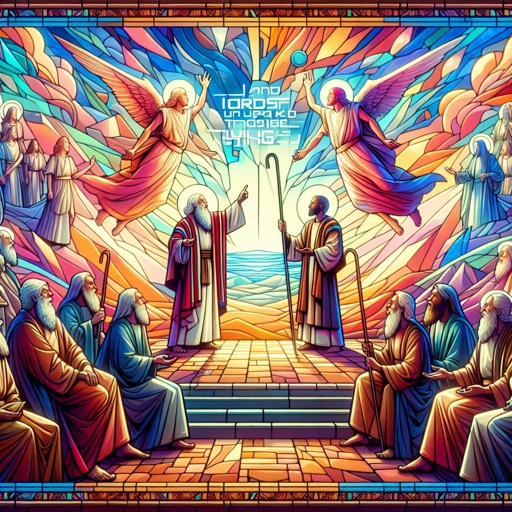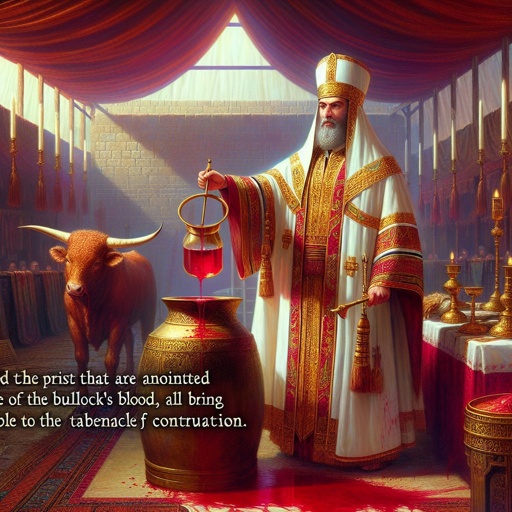What does Leviticus 21:5 mean?
"They shall not make baldness upon their head, neither shall they shave off the corner of their beard, nor make any cuttings in their flesh." - Leviticus 21:5

Leviticus 21:5 - "They shall not make baldness upon their head, neither shall they shave off the corner of their beard, nor make any cuttings in their flesh."
Leviticus 21:5 from the King James Version of the Bible reads, "They shall not make baldness upon their head, neither shall they shave off the corner of their beard, nor make any cuttings in their flesh." This verse is found in the book of Leviticus, which is the third book of the Hebrew Bible and a part of the Old Testament. In this verse, God is giving specific instructions to the priests of the Israelite community, outlining rules for their physical appearance and personal grooming.
To fully understand the significance of this verse, it is important to consider the historical and cultural context in which it was written. The book of Leviticus is largely concerned with the laws and rituals that governed the lives of the Israelites, particularly in relation to their worship practices and religious purity. The priests held a sacred and esteemed position within the community, and as such, they were held to a higher standard of conduct and appearance.
The first part of the verse prohibits the priests from making themselves bald. In the ancient Near East, the act of shaving one's head or making oneself bald was often associated with mourning or as a sign of submission and disgrace. By forbidding the priests from engaging in this practice, God is emphasizing the importance of maintaining a sense of dignity and honor in their role as spiritual leaders.
The second part of the verse instructs the priests not to shave off the corners of their beards. In ancient Hebrew culture, the beard was a symbol of masculinity, wisdom, and dignity. To shave off the corners of the beard was seen as a defilement of this symbol and a violation of the natural order. By prohibiting this practice, God is underscoring the need for the priests to uphold their masculinity and to distinguish themselves from the practices of the surrounding pagan cultures.
The final part of the verse forbids the priests from making any cuttings in their flesh. This prohibition likely refers to self-mutilation or the act of making incisions or marks on the body, which was often a form of pagan worship or mourning in the surrounding cultures. By forbidding this practice, God is reinforcing the need for the priests to maintain their physical and spiritual purity, devoid of any pagan or idolatrous influences.
In addition to its practical instructions for the priests, this verse also holds symbolic significance. The prohibition against altering their physical appearance serves to set the priests apart from the secular world and emphasizes their consecration to God. Their adherence to these regulations demonstrates their commitment to upholding the holiness and sanctity of their office.
From a broader theological perspective, this verse exemplifies the concept of holiness and separation in the Old Testament. The Israelites were called to be a holy people, set apart for God's purposes, and the priests in particular were to exemplify this holiness in their actions, appearance, and conduct. By adhering to these regulations, the priests were not only fulfilling their duties as leaders and mediators between God and the people, but also serving as a visual representation of the holiness and righteousness that God expected from His chosen people.
In summary, Leviticus 21:5 provides specific guidelines for the physical appearance and grooming of the priests, emphasizing the need for them to maintain a sense of dignity, masculinity, and purity in their roles as spiritual leaders. The verse also serves as a powerful symbol of the Israelites' call to holiness and separation, exemplifying their commitment to serving as a distinct and consecrated people unto the Lord.
Leviticus 21:5 Artwork

Leviticus 21:5 - "They shall not make baldness upon their head, neither shall they shave off the corner of their beard, nor make any cuttings in their flesh."

Leviticus 21:19 - "Or a man that is brokenfooted, or brokenhanded,"

Leviticus 21:16 - "¶ And the LORD spake unto Moses, saying,"

Leviticus 21:13 - "And he shall take a wife in her virginity."

Revelation 21:5

Isaiah 5:21

Isaiah 5:21

Genesis 21-5

Leviticus 5:14 - "¶ And the LORD spake unto Moses, saying,"

Leviticus 21:22 - "He shall eat the bread of his God, both of the most holy, and of the holy."

Leviticus 21:24 - "And Moses told it unto Aaron, and to his sons, and unto all the children of Israel."

Leviticus 23:5 - "In the fourteenth day of the first month at even is the LORD'S passover."

Leviticus 5:5 - "And it shall be, when he shall be guilty in one of these things, that he shall confess that he hath sinned in that thing:"

Leviticus 9:21 - "And the breasts and the right shoulder Aaron waved for a wave offering before the LORD; as Moses commanded."

Leviticus 21:4 - "But he shall not defile himself, being a chief man among his people, to profane himself."

Leviticus 21:20 - "Or crookbackt, or a dwarf, or that hath a blemish in his eye, or be scurvy, or scabbed, or hath his stones broken;"

Leviticus 5:19 - "It is a trespass offering: he hath certainly trespassed against the LORD."

Leviticus 24:21 - "And he that killeth a beast, he shall restore it: and he that killeth a man, he shall be put to death."

Leviticus 4:5 - "And the priest that is anointed shall take of the bullock's blood, and bring it to the tabernacle of the congregation:"

Leviticus 8:5 - "And Moses said unto the congregation, This is the thing which the LORD commanded to be done."

Leviticus 21:15 - "Neither shall he profane his seed among his people: for I the LORD do sanctify him."

Leviticus 25:21 - "Then I will command my blessing upon you in the sixth year, and it shall bring forth fruit for three years."

Leviticus 21:3 - "And for his sister a virgin, that is nigh unto him, which hath had no husband; for her may he be defiled."

Leviticus 15:21 - "And whosoever toucheth her bed shall wash his clothes, and bathe himself in water, and be unclean until the even."

Leviticus 21:11 - "Neither shall he go in to any dead body, nor defile himself for his father, or for his mother;"

Leviticus 21:2 - "But for his kin, that is near unto him, that is, for his mother, and for his father, and for his son, and for his daughter, and for his brother,"

Leviticus 10:5 - "So they went near, and carried them in their coats out of the camp; as Moses had said."

Leviticus 27:21 - "But the field, when it goeth out in the jubile, shall be holy unto the LORD, as a field devoted; the possession thereof shall be the priest's."

Leviticus 21:21 - "No man that hath a blemish of the seed of Aaron the priest shall come nigh to offer the offerings of the LORD made by fire: he hath a blemish; he shall not come nigh to offer the bread of his God."

Ephesians 5:21 - "Submitting yourselves one to another in the fear of God."